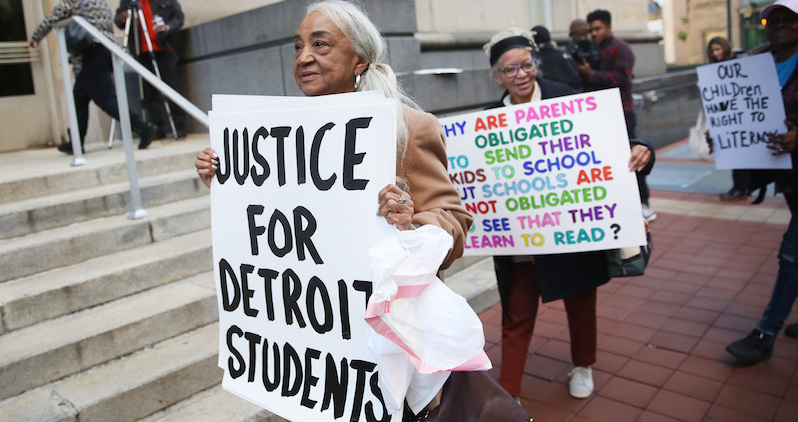A black teenager, 15, jailed for not doing her homework has been released from probation after an appeals court ordered a judge to let her go.
Judge Mary Ellen Brennan adopted a caseworker’s recommendation that the case against the teen – referred to as ‘Grace’ to protect her identity – be terminated and that she continue receiving mental health treatment at home.
This comes after the same judge sent Grace to the Children’s Village detention center in Detroit on May 14 saying her failure to complete school work had violated the terms of her parole.
The decision sparked outrage and led to protests outside Oakland County Circuit Court last month demanding the girl’s release.
Brennan released the teen from probation on Tuesday, under the orders of an appeals court.
The Michigan Court of Appeals had ordered Grace be immediately released from the facility to her mom on July 31 – a ruling that Brennan said effectively tied the lower court’s hands, The Detroit News reported.
She said Grace, who suffers from ADHD, appeared to be benefiting from the treatment she had received at the facility.
No details of that treatment have been provided.
‘This court’s goal to place her (in Children´s Village) was to address delinquent behavior and improve life at home for her and her mother,’ Brennan said.
The girl was first placed on probation last April after she was charged with stealing another student’s cellphone and assaulting her mom – known as ‘Charisse’ – during a row.
During sentencing, Grace tearfully begged Brennan not to send her to a juvenile detention facility.
‘My mom and I do get into a lot of arguments, but with each one I learn something and try to analyze why it happened,’ the teen sobbed.
‘My mom and I are working each day to better ourselves and our relationship, and I think that the removal from my home would be an intrusion on our progress.’
Brennan sentenced her to strict probation that included the completion of all schoolwork.
But when the schools shuttered due to the coronavirus pandemic, Grace’s caseworker Rachel Giroux raised concerns that the work was not being done.
In an email penned to Giroux, Grace’s teacher wrote: ‘Let me be clear that this is no one’s fault because we did not see this unprecedented global pandemic coming.
‘Grave has a strong desire to do well… [and] is trying to get to the other side of a steep learning curve mountain and we have a plan for her to get there’.
Brennan ruled that Grace was in violation of her probation in May and sent her to the detention facility for at least three months.
Th
For the first time in decades, a federal court has declared that American public school students have a constitutional right to an adequate education.
The U.S. Court of Appeals for the Sixth Circuit ruled last week that the state of Michigan had been so negligent toward the educational needs of Detroit students that children had been “deprived of access to literacy” — the foundational skill that allows Americans to function as citizens — in violation of the 14th Amendment.
The ruling came in response to a class-action lawsuit filed by a group of Detroit public school students that cited a litany of severe deficiencies: Rodent-infested schools. Unqualified and absentee teachers. Physics classes given only biology textbooks. “Advanced” high school reading groups working at the fourth-grade level.
When “a group of children is relegated to a school system that does not provide even a plausible chance to attain literacy, we hold that the Constitution provides them with a remedy,” Judge Eric L. Clay wrote for a 2-1 majority.
The overwhelming majority of students in the Detroit public schools are black or Hispanic and come from low-income families. Judge Clay noted that through the nation’s history, white people have repeatedly withheld education to deny political power to African-Americans and others, most notably under slavery and segregation.
Detroit, a center of coronavirus transmission, has closed its schools because of the pandemic and may not be able to reopen them for months, a situation that is expected to worsen inequities and have a negative impact on students’ learning for years to come.


